




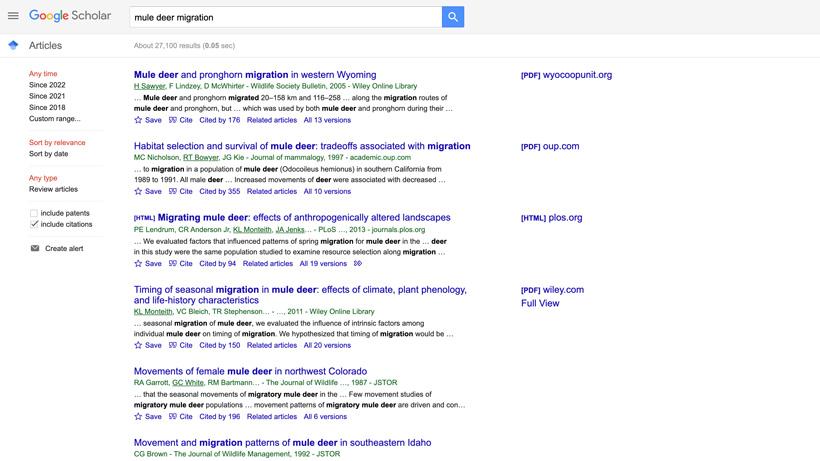
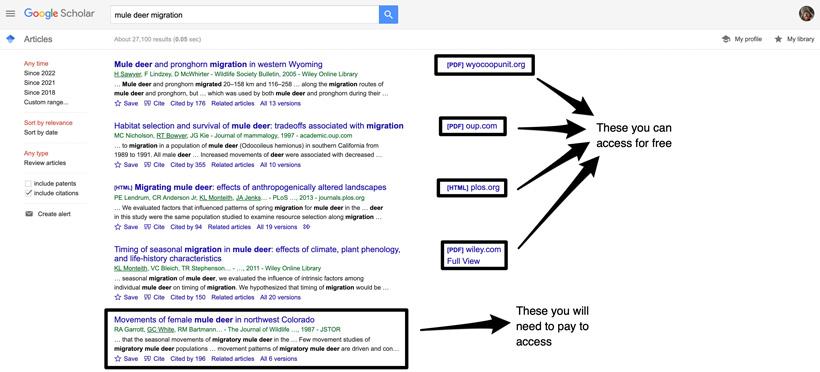
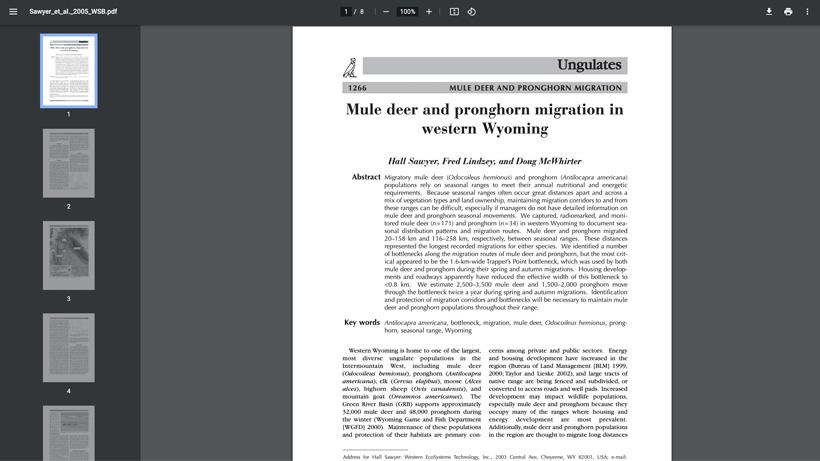
Example of a research paper I was able to open and view for free using Google Scholar.
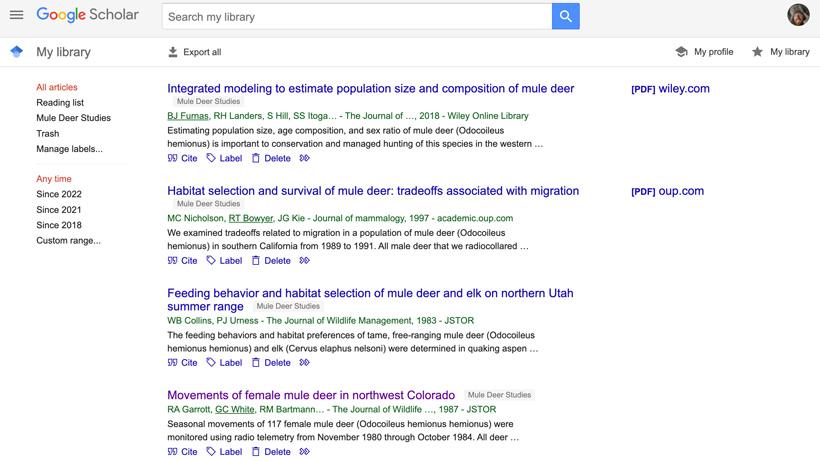
Example of a few of my saved articles in Google Scholar.
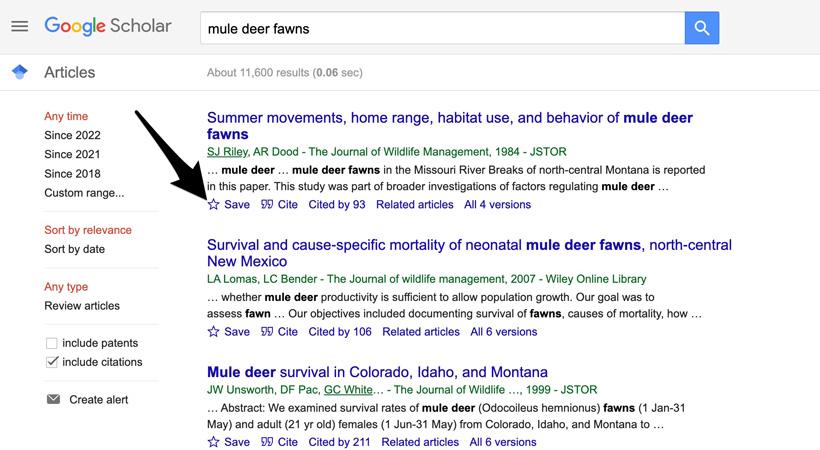
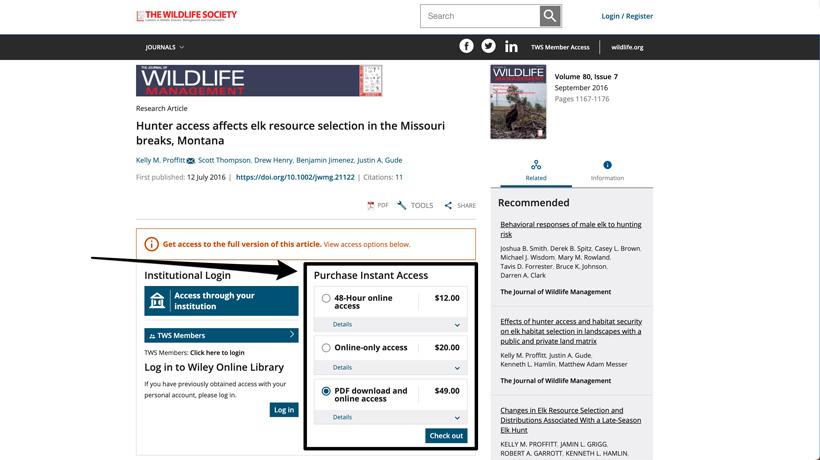
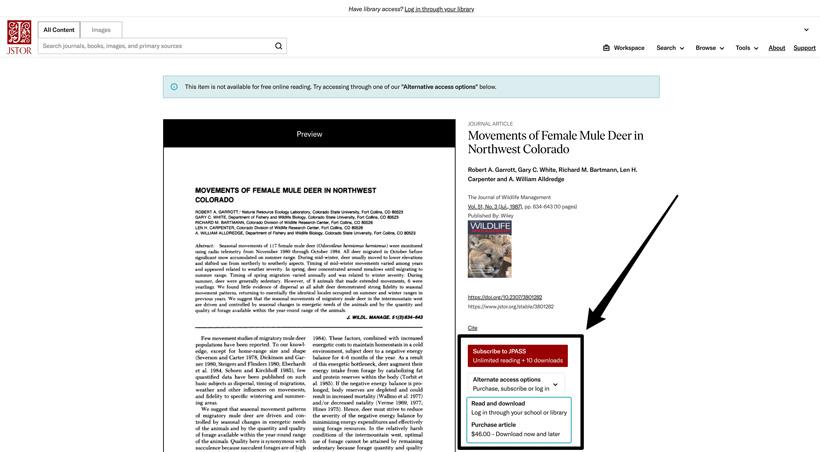
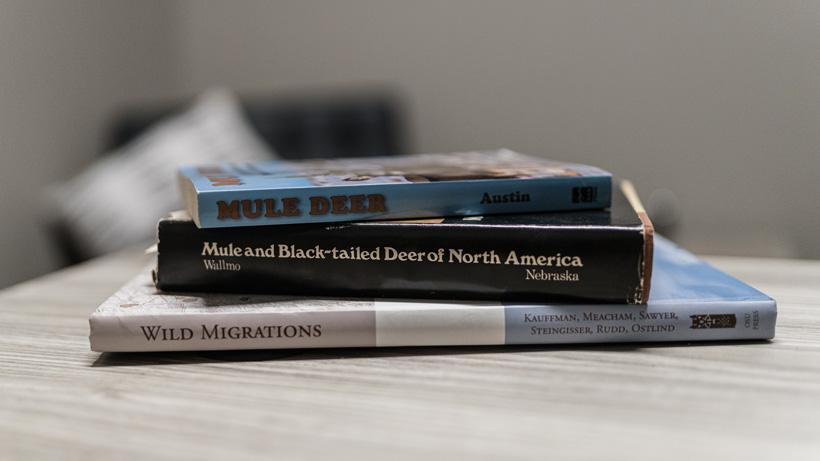
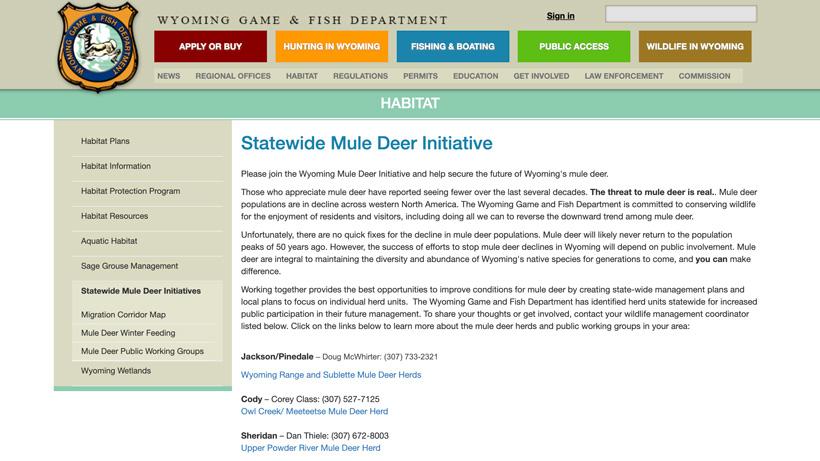
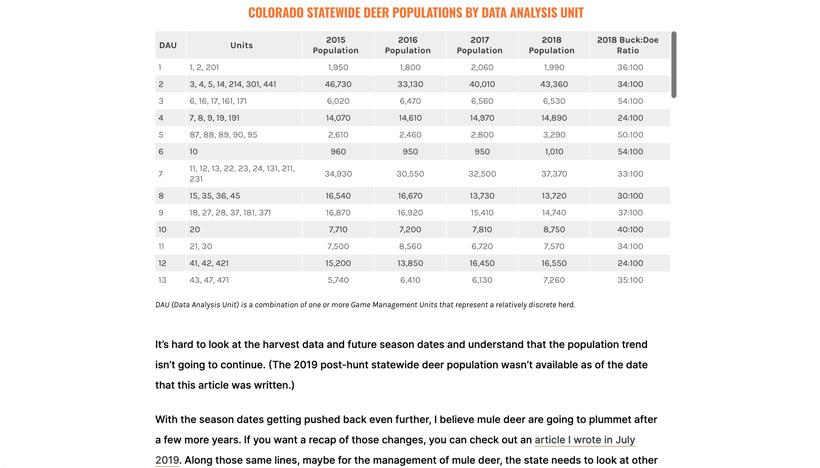
Example of a previous data heavy Insider article I wrote.
If you’ve been following some of the tactics I talk about in previous articles, seminars, podcasts, or videos, you’ll hear me mention a lot about the power of education and being a student of the game when it comes to hunting. A hidden gem I feel people overlook when it comes to adding information to your "hunting toolbox" can be found in reading biology reports!
I get a lot of emails and messages from hunters each year asking about my approach to finding biology-based information for mule deer, as well as what I'm reading book-wise. As most of you know, I love helping others. So it’s finally time I put out an article on this subject. You can also find elk biology reports or other species using this same method, but since I’m a mule deer hunter, this is based on my favorite animal.
Biology reports and peer-reviewed research studies are pure GOLD! I say it a lot, but for the most part, wildlife's daily actions are rooted in biology and science. To be a better hunter, it's best to know everything you can about the animal you're trying to hunt and find. I'm always trying to expand my knowledge in different facets of hunting techniques, and learning about animal biology ranks up there at the top of my list of what I do each year to gain a slight edge.
I use Google Scholar to find biology reports.
Back in August, I talked to Mark Livesay on our Big Hunt Guys podcast, and I dove into finding these research studies. Mark and I are cut from the same cloth and do a ton of very similar things when it comes to e-scouting and educating ourselves on animal behavior. While talking about research studies, it was interesting that Mark had not heard of Google Scholar. So I thought I should expand on this information and release this article so more people can learn about this technique.
Everyone knows that you can always do a standard Google search for some biology based studies and pretty much find endless items on the internet, but the true power, in my personal opinion, lies in Google Scholar.
Google Scholar is a free academic web search engine that pulls scholarly literature across different publications.
Google Scholar is a lot like your standard Google search engine, but it's more of an academic search engine for research-based studies. You can search specific keywords or phrases to hone in on areas of research that interest you. In the example above, you can see I searched for mule deer migration, and it gave me a bunch of articles directly related to this subject.
When it comes to mule deer, I use the following terms a lot:
There are a lot of other terms you could search for; those are just some items to get you started. If you want to narrow down your search, you can put keywords in quotes.
Note: you might not be able to find detailed wildlife studies in the same area you're planning on hunting, but the studies and information you find can be extrapolated to where you hunt.
If the article you're interested in has a [PDF] or a [HTML] link to the right of the articles, you will be able to click on that link to read/download them. If they do not have those links, then most likely you'll either need to pay for them or access them through a university or library login. More on how to access those further down in this article.
Once you click on an article that allows free access, you'll be able to read it, save it and download it to your computer.
Example of a research paper I was able to open and view for free using Google Scholar.
One of my favorite features of Google Scholar is the ability to save articles. If you're logged in to your Google account, you can actually save articles for future reference, which is totally different than using the "normal" Google search. You'll notice in the screenshot above, this is a sample of the "My library" section of my personal Google Scholar. You can even create certain folders for different species if you'd like.
To save an article, just click the save button underneath the article summary. Then you just go to your "My Library" to access the saved article links.
Sometimes, you'll land on pieces of research papers that are locked behind paywalls.
If you want to read an article that is locked behind a paywall, you have a few options. There are times I have personally paid to download certain research studies. For example, in one article example I pulled up here about a research paper on hunter access and elk resourse selection, I could purchase the single article for $49.00, which would allow me to download and print it, or I could get 48-hour access for $12.00 but I couldn't print it off.
Sometimes, you can also subscribe to whatever distribution service you're viewing in a monthly plan that gives the ability to read the full text of every article and allows you 10 article PDFs to save and keep for $19.50 a month or a yearly plan of being able to read every article and download 120 article PDFs to save and keep at $199 per year. Each service might be different. So yes... this route can get expensive. But again... it comes down to how bad do you want to learn about the animal you're hunting? To me, this is way more important than a Netflix or Hulu subscription that some people have. And a subscription could be cost effective if you find out that a bunch of articles you want to read are under the same journal.
If you have a university login or your local library is connected through these journals, you might be able to access these types of research studies for free that are normally locked behind a paywall. Luckily, many journals have opened up their access to their research articles. Some even allow you to register with them to access articles per month. Keep in mind, even if a journal says you can access articles for free, after registering, you might still be locked out and will need to pay.
Another method that might work every now and then is sometimes you can take a few of the author's names on the research study and search their name in the main Google search engine. Why do that? That process will allow you to land on the author's university website profile. Those authors may want to show off their research work, and sometimes you can download that article for free through their link on their author profile.
Another option is to again go into Google search and search that article name and add a pdf to the backside of the name in the search bar to see if another source has that article for free for you to save. Lastly, another option is to either find someone with a university school login to access on a school computer system or access through a library.
If you're willing to work hard, you can gain access to these journals.
A sample of some of the "research based" mule deer books I own. I love to read, so it's no suprise that I own just about every mule deer book that's been published.
I have also searched and bought pretty much any book I can find on mule deer biology. There is a lot of power in these types of books. You can read hunting stories and hunting tactics all day long, but again, I love reading about animal behavior to better understand the animal I'm pursuing and I find a lot of extra value in research books. Finding these books can be straightforward, or a little difficult. You'll need to get scrappy to find some that are out of print. There are endless online bookstores that you can search for books online, and you can use big websites like eBay and Amazon. What I really like to do, when traveling, I'll stop in to small bookstores and browse around. I've found some amazing gems at crazy low prices this way.
Another overlooked area are state websites. You can find some good research papers on state agency websites, although they are sometimes hard to find where they live on these state websites. This again is more data and more knowledge you can gain, and then you know that information will be based on the animal species in the state you're hunting.
Is reading endless research and biology reports an end-all solution to hunting and taking bigger bucks every year? Definitely not. But again, there is so much benefit we, as hunters, can learn from animal behavior, how an animal utilizes the landscape, and other research biologists conduct that could make us a more well-rounded hunter.
Keep in mind there's also a ton of information you can learn about animal biology by using your Insider account. Our team takes a lot of time to provide members with data-heavy articles each year. From Application Strategy articles, to Insider tips, to individual species strategies, you'll find many data stories and graphics included in a lot of articles we publish each year.
Find a collection of these articles below:
There's no better time than now to gain additional information and knowledge on the animal you're hunting. If you want a deep dive into some e-scouting tactics, check out this compelling podcast episode we did with Mark Livesay, and you'll hear us talking a lot about biology and research papers:
Migration
Telemetry
Habitat use
Buck movement
Predation
Breeding
Winter range